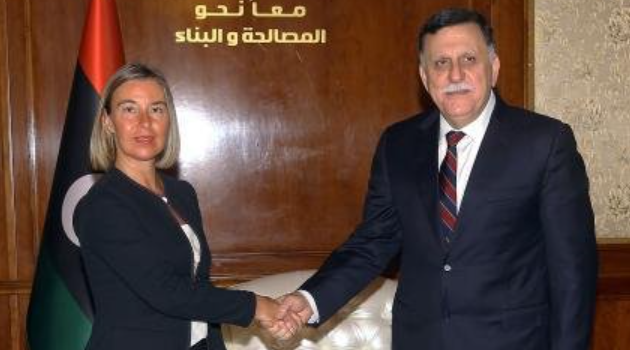Federica Mogherini, High Representative for Foreign Affairs and Security Policy/Vice-President of the Commission, visited Libya at the weekend to inaugurate the premises of the European Union Delegation to Libya and the EU Border Assistance Mission in Tripoli, and in view of the Foreign Affairs Council on Monday where the situation in Libya is on the agenda.
In Libya, the European Union is the main humanitarian aid provider, the main supporter of the UN agencies’ programmes, the main bilateral cooperation donor as well as the first economic partner.
The return of the diplomatic presence of the EU in Libya will further strengthen the cooperation with the government, the local authorities and the United Nations, and the implementation of projects on the ground.
During her visit, Federica Mogherini met with Prime Minister Fayez Sarraj, accompanied by the Foreign Minister Siala, the Special Representative of the UN Secretary-General, Ghassan Salamé, representatives of UN agencies - IOM, UNHCR, UNDP, UNICEF - and some of the beneficiaries of EU financed projects.
In her meetings, Mogherini discussed the EU’s support to the country and the most effective ways to further strengthen it. She also addressed the most recent developments in Libya, including in the Oil Crescent.
High Representative Mogherini restated the European Union's support for the Libyan political process, in the framework provided by the United Nations, including preparations for elections. She stressed the need to prepare elections on a solid legal and constitutional basis, and the need that the results are accepted by all. Mogherini discussed during the meetings the support the EU is already providing for the preparation of elections and the additional assistance it is ready to mobilise to accompany this process.
On top of its political support to Libya, the European Union is the main provider of assistance to improve the lives of Libyan citizens and help them to rebuild their country politically, socially and economically. During the meetings, new initiatives in the areas of health, education, media, youth, support to municipalities, governance and security were discussed.
The close cooperation of the EU with the Libyan authorities and the United Nations agencies - namely the United Nations High Commissioner for Refugees (UNHCR) and International Organisation for Migration (IOM) - has allowed for assistance and protection to refugees, migrants and internally displaced people in the country, to save lives at sea and assist thousands of people to voluntarily return to their countries, while fighting against the trafficking of human beings.
Federica Mogherini discussed with Prime Minister Sarraj the EU’s training of the Libyan coast guard through Operation Sophia, and the cooperation through EUBAM in supporting the authorities to manage the land borders, particularly in the South, also in the framework of regional initiatives.
They also discussed the successful work done by the Task Force established by the European Union, the African Union and the UN at the EU-African Union summit in Abidjan last November, that has led to assisted voluntary return of 20.000 irregular migrants from Libya to their countries of origin.
(Source: EU)





